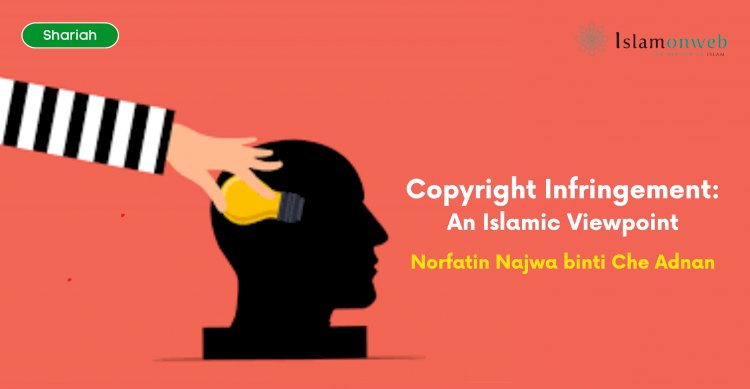Copyright Infringement: An Islamic Viewpoint
Introduction
Intellectual property rights, including copyrights, have become an important issue in today's globalized world. As the digital age has made it easier to reproduce and distribute information, it has become increasingly important to establish legal frameworks for protecting the rights of creators and publishers. Islamic law, which encompasses both religious and legal principles, has much to say about intellectual property rights, including copyrights.
Definition of Copyright
It is important to understand that copyright is regarded as a form of property right under Islamic criminal law. The word "al-milku" encompasses everything that belongs to humans in the form of property. Thus, scholars may hold different opinions on the limits of ownership, influenced by their perspectives on what can be considered property and what cannot be owned according to Sharia.[1]
Copyright is the creator's exclusive right to publish or reproduce their creation in the realms of science, art, and literature. This encompasses works such as books, computer programs, lectures, speeches, and other equivalent productions, as well as related rights. Traditionally, copyright has primarily been associated with books. However, in recent times, its scope has expanded to include the protection of various forms of expression, including literary, dramatic, musical, and artistic works. This includes but is not limited to sound recordings, film and television broadcasts, and computer programs.[2] In general, copyright infringement occurs when content is used without the permission of the author, who holds exclusive rights to their creation. However, copyright infringement does not apply if similar works are independently produced, in which case each creator retains ownership of their respective work.
Types of Copyright Infringement
Copyright infringement can be classified into two types which are direct and indirect.
- Direct copyright infringement
It happens when someone directly copies, distributes, or reproduces a copyrighted work without the authorization of the owner.[3] To be precise, it is an obvious breach of the exclusive rights provided to the authorised copyright holder. Examples of this infringement include:
- Copying and sharing a copyrighted book without permission.
- Uploading a copyrighted movie and sharing to the website.
- Performing a copyrighted song in public without obtaining a license.[4]
- Indirect copyright infringement
It is also referred as secondary infringement, and it occurs when an individual contributes to or gain advantages from a direct violation, without committing the act themselves.[5] In short, indirect infringement involves actions that either support or derive benefits from such violations. This infringement may encompass the following:
- Providing an accessible platform that facilitates illegal file-sharing.
- Selling a device designed to bypass copyright protection measures.[6]
Rulings on Copyright in Islam
There are several verses in the Quran, narrations of Hadith, and opinions from scholars that indirectly emphasize the respect for property rights. One Quranic verse, with translation, states, "And do not consume one another's wealth unjustly or send it [in bribery] to the rulers in order that [they might aid] you [to] consume a portion of the wealth of the people in sin, while you know [it is unlawful]" (Surah Al-Baqarah:188). This verse prohibits the unjust consumption of someone else's wealth, which could include copyright infringement. Another verse states, "Do not withhold the rights of the people, and do not practice extortion upon earth, spreading corruption" (Surah As-Shu'ara:183). This verse emphasizes the importance of respecting the rights of others and avoiding corruption, which could include infringing on someone's copyright.
The narration of Hadith of the Prophet Muhammad (peace be upon him) also states, "Whoever cheats us is not one of us" (Sahih Muslim). This Hadith emphasizes the importance of honesty and integrity in dealings with others, including respecting their intellectual property rights. The Prophet Muhammad (peace be upon him) also said, "The property of a Muslim is not lawful for another Muslim without his permission" (Sahih Muslim). This Hadith highlights the importance of seeking permission before using someone else's property, including their intellectual property.
In addition to the basic principles of Islamic maintenance of intellectual property rights, there are also specific arguments by selected classical scholars related to intellectual property rights. Islam divides property into that which cannot be cheated and taken ownership of. Imam as-Shatibi believed that property refers to the legal entitlement of an owner, as ownership is the relationship between the owner and the thing owned. Imam al-Qarafi added that such legal entitlement may vest in corporeal and non-corporeal things. Thus, with this relationship, an owner has the right to prevent others from encroaching on his legal entitlements on the property or exploiting it without his consent.[7]
The Al-Azhar Fatwa Committee holds the opinion that quoting portions of a book, magazine, or any other piece of writing is lawful, provided that the original authors of these writings are cited. However, copying others' writings and presenting them as one's own thoughts is considered a form of plagiarism that is unlawful both in Sharia law and in man-made laws.[8] Dr. Muzammil H. Siddiqi, former President of the Islamic Society of North America, states: “It is correct that the knowledge is a common property. But it does not mean that people cannot sell books or own books. It does not mean that people can go and steal books or take over other people’s labs and libraries. It means that all people should be free to learn. No one group should have monopoly on knowledge.[9] Subsequently, the Permanent Fatwa Committee pointed out that it is forbidden to make copies of programs if their owners do not permit doing so without their prior permission.[10] In essence, these scholars agree that using others' work without their consents or proper acknowledgment goes against Islamic principles and laws.
Causes of Copyright Infringement
Recently, copyright infringement has become an ongoing issue in the digital world, posing challenges for creators and content owners. Therefore, it is crucial to understand the causes of copyright infringement, as outlined below:
- Lack of understanding of the commercial aspects of intellectual property:
This lack of understanding is highlighted by a preliminary study, which reveals that only a few creative works produced by undergraduate students in creative arts are registered as industrial designs, copyrighted works, or trademarks with the Intellectual Property Unit of UiTM. Numerous cases of unauthorized use and violation of intellectual property rights belonging to creative arts students underscore the importance of educating these students on intellectual property law. Some reported incidents involve the unauthorized use of students' creative works, including publishing, modifying, distributing, and sharing them without permission. The students encountered difficulties in enforcing their rights because they lacked proper records and documentation of their copyrighted works and industrial designs.[11] This has shown that there are some people who are still not aware on the importance of copyright protection.
- Desire for free access to digital content
Some individuals who engage in copyright infringement support the notion that all digital content should be available for free, believing that acts of piracy contribute to making it freely accessible. However, this perspective overlooks the fact that creating content involves costs and is not inherently free. Furthermore, without the possibility of recouping one's investment and making a profit, there is a lack of motivation to generate more content. This indicates that if everything is available for free, creators may be demotivated to produce more valuable content because they could not recover the expenses or earn a living from their work. Therefore, while some argue that all digital content should be free, it is essential to consider the financial aspect of content creation and the implications it has on creators' ability to sustain themselves and produce high-quality content.
Consequences of Copyright Infringement
The outcomes of copyright violation are inevitable, and each action comes with several repercussions as well. It is undeniable that copyright infringement carries significant consequences that may impact both individuals and society as following:
- Violation of property rights of the owner.
In Islam, property rights are considered sacred, and it is prohibited to take someone else's property without their consent. In example, distributing copyrighted material without permission is therefore considered haram (forbidden) and goes against the principles of Islamic law.[12]
- Harm to copyright owner's interests.
It can bring harm to the interest of copyright owner, particularly if the distribution is done on a large scale. This can result in lost revenue for the copyright owner and may discourage them from creating or distributing new works in the future.[13]
- Legal consequences.
Copyright infringement may lead to the legal consequences that include hefty fines and imprisonment, depending on the laws of the country in which the distribution occurs.[14] In Islamic teaching, it is crucial to respect the laws of the land in which one resides, and violating copyright laws can therefore be considered impermissible from both a legal and ethical perspective.
Recommendations in Enhancing Copyright Protection
As technology develops and the digital landscape evolves, the necessity to strengthen copyright protection becomes increasingly crucial. Protecting creators' rights is essential for fostering innovation and encouraging creativity. Understanding copyright laws assists owners in safeguarding their ownership rights. Regularly reviewing provisions to reflect the current technological landscape is vital for protecting owners' rights while allowing for reasonable use and innovation. However, giving credit to the owner's creation must always be prioritized.
Preventing copyright infringement requires advocating ethical behavior, with a strong emphasis on educational initiatives from the outset. Campaigns aimed at raising public awareness about the ethical considerations surrounding intellectual property can help establish a more conscious society. By clarifying the repercussions of unauthorized use and emphasizing the moral imperative of respecting creators' rights, such efforts can contribute to reducing infringement.
Conclusion
In conclusion, copyright requires legal protection from both the State and religion. Any form of copyright infringement is a serious offense that should be avoided and eliminated. Islam expressly recognizes and safeguards copyright, prohibiting all forms of infringement as it involves deceit akin to stealing. Such actions harm the creativity and thoughts of the creators and contradict the goals of Islamic law. Therefore, it is crucial to respect and adhere to copyright rules to ensure fairness and honesty in intellectual property matters.
[As part of Synergised Academic and Student Activities, this article was prepared for the course RKFQ 4141A, Qadaya Fiqhiyyah Mu’asirah: Contemporary Juristic Issues at AHAS KIRKHS, IIUM (Sem 1, 2023-2024]
References
Abdillah, M. A., Nairazi, & Agustina, L. (2022). Copyright Infringement Crime in Islamic Criminal Law. Legalite: Jurnal Perundang Undangan Dan Hukum Pidana Islam, 7(2), 119–131. https://doi.org/10.32505/legalite.v7i2.5368
Al-Qurafi, Shihab al-Din Abu 1-Abbas b. Idris al-Sanhaji (d.684H), Kitab al-Furug (1345H), Matba'ah Dar Ihya al-Kutub 'al- 'Arabiyyah, Cairo.
Al-Shatibi, Abu Ishaq Ibrahim b. Musa al-Ghamati (d. 790H), al-Muwafagat fi Usul al-Shari'ah, Cairo: n.d 4 vols.
Copyright Infringement and Islamic Morality: A Critical Assessment of Online Sharing and Piracy. (2023, February 25). Arriqaaq. https://www.arriqaaq.com/copyright-infringement-in-islam/
Islam Forbids the Violation of Copyrights and Laws Regarding Intellectual Property – Islamic Economics & Finance Pedia. (2009, October 25). https://www.iefpedia.com/english/?p=2923
Ibn. Manzur, Abu al-Fad Jamal al-Din Muhammad b. Mukran (d.7 1 1H), Lisan al-Arab, (1375H/1956M), Matba'ah Dar-Sadir, Beirut.
Johnson, D. (2021, March 26). What is piracy? Here’s what you need to know about digital piracy, and how to avoid stolen digital content. Business Insider. https://www.businessinsider.com/guides/tech/what-is-piracy
Manish Jindal. (2023). Difference Between Direct and Indirect Copyright Infringement. Bytes Care Blog. https://bytescare.com/blog/difference-between-direct-and-indirect-copyright-infringement
Hashim, H. N. M., Isa, F. M., Helmi, M., & Khair, M. (2023). Designing Intellectual Property Law and Creative Industry Course Syllabus for Creative Arts Undergraduate Students.
Endnotes
[1] Ibn Mandzur Afriki, Lisanul Arab, Dar al-Ma’arif, (Cairo: Volume 13), pp. 183-184.
[2] Abdillah et al., “Copyright Infringement Crime in Islamic Criminal Law.” Legalite: Jurnal Perundang Undangan Dan Hukum Pidana Islam 7 (2) (2022): 119–31. https://doi.org/10.32505/legalite.v7i2.5368.
[3] Manish Jindal, “Difference Between Direct and Indirect Copyright Infringement”, (2023), retrieved from
https://bytescare.com/blog/difference-between-direct-and-indirect-copyright-infringement
[4] Ibid.
[5] Ibid.
[6] Ibid.
[7] Shihab al-Din Abu 1-Abbas b. Idris al-Sanhaji, Al-Qarafi, (d.684H), Kitab al-Furug (1345H), Matba'ah Dar Ihya al-Kutub 'al- 'Arabiyyah, Cairo.
[8] “Islam Forbids the Violation of Copyrights and Laws Regarding Intellectual Property – Islamic Economics & Finance Pedia.” 2009. October 25, 2009. https://www.iefpedia.com/english/?p=2923.
[9] Ibid.
[10] Ibid.
[11] Hashim, Haswira Nor Mohamad, Farizah Mohamed Isa, Muhamad Helmi, and Muhamad Khair. "Designing Intellectual Property Law and Creative Industry Course Syllabus for Creative Arts Undergraduate Students." (2023). International Journal of Academic Research in Progressive Education and Development 12(1).
[12] “Copyright Infringement and Islamic Morality: A Critical Assessment of Online Sharing and Piracy.” 2023. Arriqaaq. February 25, 2023. https://www.arriqaaq.com/copyright-infringement-in-islam/.
[13] Ibid
[14] Ibid.
About the author
Norfatin Najwa binti Che Adnan is pursuing her Bachelor's degree in Islamic Revealed Knowledge and Heritage (Fiqh and Usul al-Fiqh) at AHAS, KIRKHS, in the International Islamic University Malaysia.]
Disclaimer
The views expressed in this article are the author’s own and do not necessarily mirror Islamonweb’s editorial stance.
























Leave A Comment